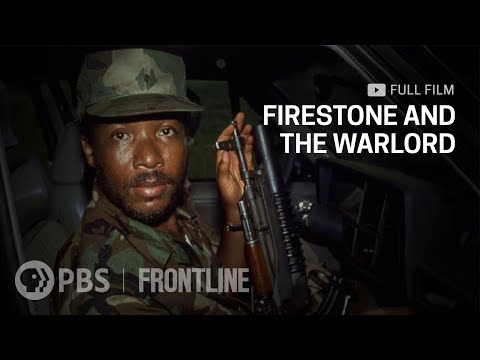
What are the costs of doing business in a war zone? FRONTLINE and ProPublica investigated the relationship between the iconic tire company Firestone and the infamous Liberian warlord Charles Taylor. (Aired 2014)
This journalism is made possible by viewers like you. Support your local PBS station here: http://www.pbs.org/donate.
Based on the inside accounts of Americans who helped run a rubber plantation for the company in Liberia, diplomatic cables and court documents, the investigation revealed how Firestone conducted business during a brutal Liberian civil war that began on Christmas Eve, 1989.
With remarkable access to key participants, the 90-minute documentary pieced together how, over the next several years, the stories of Charles Taylor, the American-educated warlord notorious for his use of child soldiers, and Firestone, Liberia’s largest private employer, intersected in fateful ways.
FRONTLINE producer Marcela Gaviria teamed up with reporters T. Christian Miller of ProPublica and Jonathan Jones to bring this story to light. Their investigation uncovered how, in exchange for being able to operate, Firestone made a deal with Taylor and, in Taylor’s own words, served as “at that particular time our most significant principal source of foreign exchange” — and how Taylor turned the Firestone plantation into a rebel base that he used to wage war.
“Do I think they have blood on their hands? Yes. I believe they facilitated a warlord in his insurrection and in the atrocities that he created,” Gerald S. Rose, Dpty. Chief of Mission, Liberia, 1991-93, told FRONTLINE and ProPublica in the 2014 documentary.
Firestone said it was powerless to prevent Taylor from occupying the plantation and that at no time did the company have a collaborative relationship with him. “Firestone’s decision to remain in Liberia was very costly for the company. Firestone was able to preserve an important economic asset for Liberia, and we are proud of that,” Firestone and its parent company, Bridgestone, told FRONTLINE and ProPublica at the time.
“Firestone and the Warlord” raised provocative questions about corporate responsibility, accountability, and the ethical ramifications of doing business in conflict zones.
Explore additional reporting on "Firestone and the Warlord" on our website:
https://to.pbs.org/3TmkFi4
“Firestone and the Warlord” is a FRONTLINE production with Rain Media in partnership with ProPublica. The writer, director and producer is Marcela Gaviria. The co-producers are Will Cohen and Maeve O’Boyle. The reporters are Jonathan Jones and T. Christian Miller.
#Documentary #Firestone #Liberia #CharlesTaylor #Business
Subscribe on YouTube: http://bit.ly/1BycsJW
Instagram: https://www.instagram.com/frontlinepbs
Twitter: https://twitter.com/frontlinepbs
Facebook: https://www.facebook.com/frontline
FRONTLINE is produced at GBH in Boston and is broadcast nationwide on PBS. Funding for FRONTLINE is provided through the support of PBS viewers and by the Corporation for Public Broadcasting. Additional support for FRONTLINE is provided by the Abrams Foundation, the John D. and Catherine T. MacArthur Foundation, Park Foundation, the Heising-Simons Foundation; and the FRONTLINE Journalism Fund, with major support from Jon and Jo Ann Hagler on behalf of the Jon L. Hagler Foundation.
CHAPTERS:
Prologue – 00:00
A Story About Business and War – 1:10
Charles Taylor Declares a Revolution – 4:54
Firestone’s History in Liberia & Treatment of Plantation Workers- 11:43
Charles Taylor’s Forces Seize Firestone Plantation – 24:19
Charles Taylor Seeks ‘Absolute Power’; Accounts of Atrocities Mount – 36:10
Firestone Makes a Deal With Charles Taylor – 49:22
Firestone Restarts Operations at Its Plantation – 1:02:13
Charles Taylor’s All-Out Assault on Monrovia, Liberia – 01:10:14
Charles Taylor: Firestone Plantation Provided ‘Financial Assistance That We Needed for the Revolution’ – 1:17:44
Credits – 1:21:52